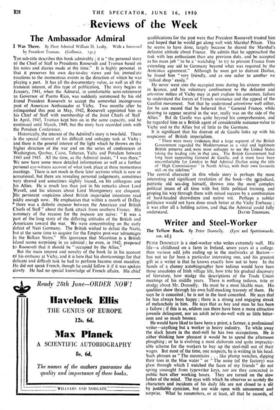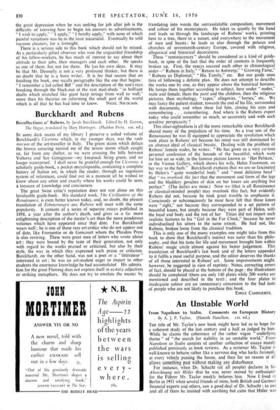Writer and Steel-Worker
PETER DONNELLY is a steel-worker who writes extremely well. His life—a childhood on a farm in Ireland, seven years at a college. then various odd, jobs ending up in the steelworks at Barrow— has not so far been a particular interesting one, and his greatest gift as a writer is that he knows exactly how not to bore. In the hands of a clumsy autobiographer how tedious would have been those anecdotes of Irish village life, how trite his gradual discovery of literature, how stodgy the descriptions of the Trade Union meetings of his middle years. There is nothing tedious, trite or stodgy about Mr. Donnelly. He must be a most likable man. His qualities show through his own half-mocking travesty of them. He says he is conceited ; he is not in the least conceited. He says that he has always been happy ; there is a strong and engaging streak of melancholy in him. He says that as boy and man he has been a failure ; if this is so, seldom can there have been a more attractive juvenile delinquent, nor an adult ne'er-do-well with so little bitter- ness and so much bounce.
He would have liked to have been a priest, a farmer, a professional writer—anything but a worker in heavy industry. To while away the slack ttours in the steel-mill he has two occupations. He is either•thinking how pleasant it would be to spend the afternoon ploughing ; or he is evolving a most elaborate and quite impractic- able scheme for the workers to buy up the steel-mill out of their wages. But most of the time, one suspects, he is writing in his head. Such phrases as " The mountains . . . like plump wenches, dipping their toes in the blue water " or " The noise (of the factory) was glass through which I watched the faces of my friends " do not spring unsought from typewriter keys, nor are they concocted in public bars after working hours. They are turned on the slow lathes of the mind. The eyes with which he observes so acutely the characters and incidents of his daily life are not closed to a slit by justifiable cynicism, but are wide open with amusement and surprise. What he remembers, or at least, all that he records, of the great depression when he was seeking for job after job is the difficulty of knowing how to begin his answers to advertisements, "I wish to apply," " I apply," " I hereby apply," with none of which painful variations was he in the least successful. Eventually he sold vacuum cleaners, for a fortnight.
There is a serious side to this book which should not be missed. As a particularly gifted observer who won the unguarded friendship of his fellow-workers, he has much of interest to say about their attitude to their jobs, their managers and each other. He speaks as one of them, but not for them. He has his own ideas. It may be that Mr. Donnelly is not a very profound thinker, but there is no doubt that he is a born writer. It is for that reason that on finishing the book, one recalls paragraphs like the one that begins: "I remember a lad called Biff " and the description of the sun's rays breaking through the black-out of the vast steel-sheds " in brilliant shafts which stretched like giant harp strings from wall to wall," more than his theories on reforming the small part of the world
which is all that he has had time to know. NIGEL N1C0LSON.





































 Previous page
Previous page